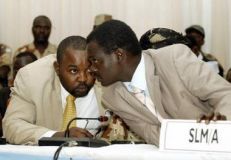Divided Darfur rebels face pressure to join deal
May 9, 2006 (ABUJA) — Diplomatic efforts to include more rebels from Sudan’s Darfur region in a peace agreement intensified on Tuesday, but new cracks appeared within the one faction that has signed the deal.
 The Sudanese government and one group within the rebel Sudan Liberation Army (SLA), led by Minni Arcua Minnawi, signed a peace settlement on May 5 but rival SLA factional leader Abdel Wahed Mohammed al-Nur rejected it. The smaller Justice and Equality Movement (JEM) also refused to sign.
The Sudanese government and one group within the rebel Sudan Liberation Army (SLA), led by Minni Arcua Minnawi, signed a peace settlement on May 5 but rival SLA factional leader Abdel Wahed Mohammed al-Nur rejected it. The smaller Justice and Equality Movement (JEM) also refused to sign.
Nigerian President Olusegun Obasanjo met Nur on Tuesday in the latest of a series of attempts to persuade him to change his mind, but Nur said after the meeting he still felt the agreement did not meet the basic needs of the people of Darfur.
“The agreement addresses humanitarian and military issues but not the political issues that are the root cause of the conflict,” Nur told Reuters at a hotel in the Nigerian capital where the peace talks took place for the past six months.
“I will remain here until the 15th (of May) to salvage an agreement,” he said, listing a series of well-known demands including greater political representation for the rebel movements in regional and national institutions.
The SLA and the JEM took up arms in early 2003 accusing the Arab-dominated central government of neglecting Darfur, an ethnically mixed region the size of France in the west of Sudan.
Khartoum backed militias drawn from Arab tribes to crush the rebellion. Tens of thousands of people have died and more than 2 million have fled their homes in the ensuing campaign of murder, rape, looting and arson.
The Peace and Security Council of the African Union (AU), the body that will formally take possession of the peace agreement and hand it to international guarantors, meets on May 15. That date is effectively a deadline for any new signatures to be added to the document.
The top U.N. envoy in Sudan, Jan Pronk, told reporters that the Security Council would decide what happened to those who did not sign the deal. Targeted sanctions were a possibility.
INFIGHTING
Divisions among the rebels were one of the main difficulties during almost two years of peace talks in Abuja, and after the signature they continued to undermine the peace process.
Ibrahim Ahmed Ibrahim, formerly a close adviser to Minnawi, broke ranks with the factional leader on Tuesday over what he said was a lack of consultation before the signing.
“I have written to (U.N. Secretary General) Koffi Annan … We have many bodies in the SLA to make a decision but Minni made his decision alone and under too much pressure,” Ibrahim told Reuters by telephone from London.
AU diplomats in Abuja said Ibrahim, who is based in Britain, did not command any fighters and his defection was not a serious threat to the accord. However, it will do nothing to reassure Minnawi that he has widespread support for his decision.
“Minni is working out his next move. What he really wants is to get Abdel Wahed (Nur) on board. It was never his intention to sign alone,” said one senior AU source in Abuja. Minnawi was still in Abuja, as were many AU diplomats.
Minnawi is the strongest of the rebel factional leaders in terms of fighters on the ground, but observers fear that if he remains the only signatory to the peace agreement, it will not be accepted by the majority of the people of Darfur.
These fears were heightened on Monday when thousands of Darfuris, angry about what they saw as an incomplete deal, attacked an aid worker during a visit to a camp for internal refugees by the top U.N. humanitarian official, Jan Egeland.
They later ran riot and beat to death a Sudanese translator working for the 7,000-strong AU peacekeeping force in Darfur.
(Reuters)
